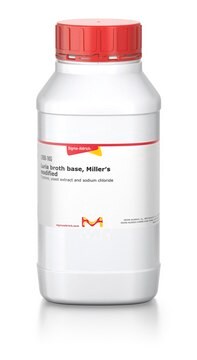L3147
LB Broth with agar (Miller)
Highly-referenced nutrient-rich microbial growth powder medium with Agar, suitable for regular E.coli culture.
Synonym(s):
Luria Agar, Luria Bertani agar, Miller’s LB agar, lysogeny broth agar
About This Item
Recommended Products
grade
for molecular biology
Quality Level
sterility
non-sterile
form
powder
composition
Agar, 15 g/L
NaCl, 10 g/L
Tryptone, 10 g/L
Yeast Extract, 5 g/L
technique(s)
microbiological culture: suitable
pH
6.8-7.2(4% solution)
application(s)
food and beverages
microbiology
storage temp.
room temp
suitability
nonselective for Escherichia coli
nonselective for coliforms
General description
Application
Features and Benefits
- Easy scale-up using larger package sizes
- A budget-friendly alternative to pre-poured plates
- Standard formulation
Preparation Note
2. Heat to boiling while stirring to dissolve.
3. Autoclave for 15 minutes at 121°C.
4. Cool to 50°C prior to dispensing into sterile petri dishes.
To prepare the medium of Luria and Burrows: Add 1 g glucose to medium and proceed with preparation instructions above.
To prepare the medium of Luria, Adams and Ting (also known as LC agar): Aseptically add 25 ml of sterile 0.1 M calcium chloride after autoclaving.
Reconstitution
related product
Storage Class Code
11 - Combustible Solids
WGK
WGK 3
Flash Point(F)
Not applicable
Flash Point(C)
Not applicable
Certificates of Analysis (COA)
Search for Certificates of Analysis (COA) by entering the products Lot/Batch Number. Lot and Batch Numbers can be found on a product’s label following the words ‘Lot’ or ‘Batch’.
Already Own This Product?
Find documentation for the products that you have recently purchased in the Document Library.
Customers Also Viewed
Articles
The development of genetic engineering and cloning has opened many possibilities of expression and isolation of heterologous proteins for research purposes. Considerable advances in technology have enabled expression and isolation of recombinant proteins in large scale.
Protocols
General protocols for growth of competent cells in microbial medium.
Our team of scientists has experience in all areas of research including Life Science, Material Science, Chemical Synthesis, Chromatography, Analytical and many others.
Contact Technical Service
